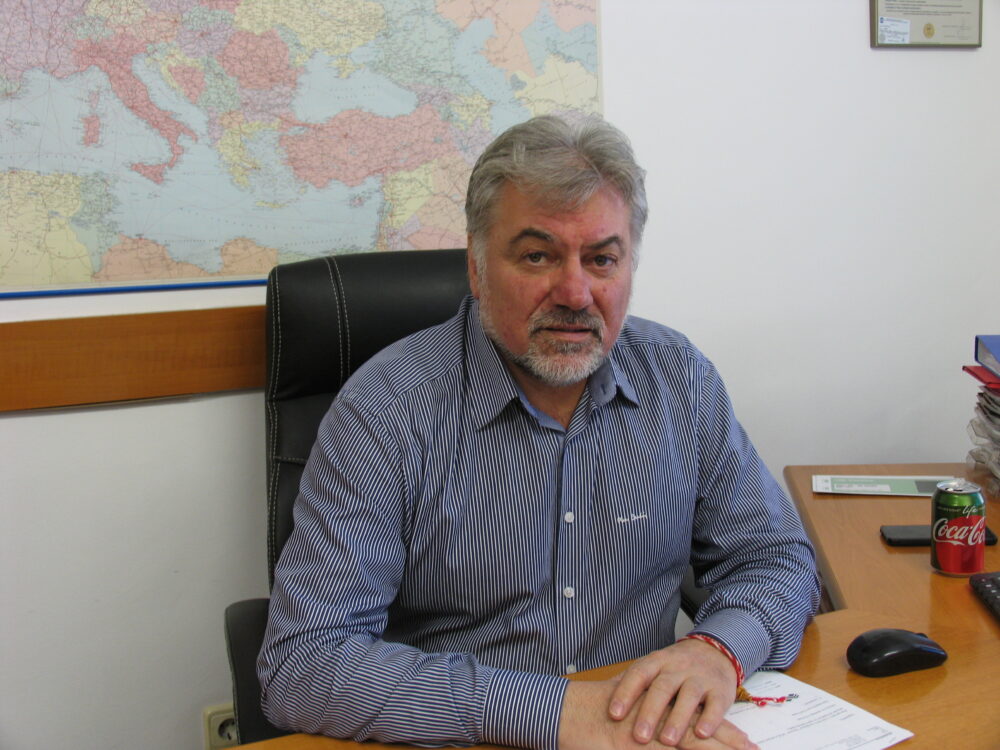Anton Taskov, the owner of Bulgaria’s first privately owned road marking company, shares his expertise and perspectives on improving the Bulgarian road system to align with international standards and ensure the country’s integration within the European Union.
In a recent interview with Forbes magazine, Mr. Taskov emphasized the importance of using thermoplastic, a material for horizontal road markings, to achieve optimal visibility regardless of the season or weather conditions. As a pioneer in the use and production of thermoplastic in Bulgaria, his company, ‘Signalizacia,’ has built a reputation for uncompromised quality over its nearly 30-year existence.
When asked why he chose thermoplastics and why it is the ideal material for road markings, Mr. Taskov highlighted several factors: durability, price, environmental friendliness, and safety. He explained that traditional acrylic paint used in Bulgaria often deteriorates quickly, with the reflective pearls losing visibility soon after application. In contrast, thermoplastic has been widely adopted in developed countries since the 1950s due to its durability and cost-effectiveness on highways, first-class and second-class roads worldwide.
Today, thermoplastic remains a popular choice for road markings due to its long-term effectiveness, cost-efficiency, and versatility. Evolving production and application techniques have further improved night visibility and enhanced safety on wet and challenging road surfaces. Notably, thermoplastic is suitable for extreme hot and cold weather conditions, making it highly desirable. Its durability often exceeds a five-year lifespan.
The application of thermoplastic involves specialized machines that apply the material at temperatures exceeding 200 degrees Celsius. Reflective glass beads are mixed into the material, ensuring consistent visibility throughout its usage. These beads resurface gradually through friction, maintaining excellent street marking visibility. In recent years, manufacturers of cold plastic have also started incorporating improved techniques with reflective pearls, although the quantity used still lags behind thermoplastics.
Statistics demonstrate progress in road safety in Bulgaria over the years, with a decrease in fatalities despite an increase in registered vehicles. However, there is room for further improvement. Leading countries in the industry, such as Sweden, have pursued initiatives like the “Vision 0” project, aiming for zero fatalities on their roads. By adopting best practices and know-how from these countries, Bulgaria can strive towards achieving similar results and enhancing road safety.
Environmental considerations are also paramount, particularly in the current climate context. Thermoplastic proves to be eco-friendly, as studies show it does not release harmful volatile substances, unlike acrylic paint and cold plastic. Several European countries have limited the use of cold plastic and acrylic paint due to their toxicity, pollution, and risks to human health.
To address industry challenges effectively, unifying road standards based on European norms rather than selective application would be beneficial. Mr. Taskov believes that the Bulgarian government should prioritize people’s health, safety, and genuine needs in their decision-making process.
Anton Taskov’s expertise and dedication to introducing world-class road marking solutions in Bulgaria pave the way for safer, environmentally friendly, and internationally compliant road systems in the country.






purchase lasuna pills – purchase lasuna without prescription buy himcolin without a prescription
besifloxacin online – purchase carbocisteine online purchase sildamax for sale
buy gabapentin without prescription – ibuprofen 600mg pill buy sulfasalazine 500mg pill
order probenecid 500 mg sale – probenecid sale buy tegretol sale
celecoxib for sale – buy generic flavoxate order generic indocin 75mg
mebeverine 135 mg sale – order etoricoxib buy generic pletal over the counter
cheap rumalaya online – shallaki sale amitriptyline 10mg drug
mestinon 60mg over the counter – purchase imuran generic cost azathioprine 50mg
cheap voveran for sale – buy generic isosorbide 20mg cheap nimotop pill
cost baclofen 25mg – feldene buy online order feldene 20 mg generic
order meloxicam 7.5mg online – order rizatriptan 5mg online ketorolac us
buy generic cyproheptadine – cyproheptadine 4mg sale zanaflex pills
buy artane generic – order diclofenac gel purchase voltaren gel for sale
cefdinir without prescription – order cleocin sale
prednisone 10mg pill – prednisone 10mg usa buy elimite creams
betamethasone online buy – purchase betnovate generic order benoquin cream
metronidazole 200mg tablet – cenforce 50mg canada buy generic cenforce
augmentin for sale – amoxiclav online order buy synthroid 100mcg for sale
cleocin price – cleocin 300mg drug indomethacin generic
hyzaar online – buy losartan 50mg generic keflex medication
eurax us – aczone brand buy aczone pills for sale
provigil pills – phenergan price order meloset 3mg without prescription
zyban 150 mg uk – ayurslim tablet shuddha guggulu generic
capecitabine 500 mg ca – order xeloda online danocrine order online
buy progesterone 100mg pills – buy ponstel generic cheap clomiphene without prescription
buy alendronate generic – buy provera cheap order provera 10mg online
norethindrone 5mg cost – buy bimatoprost medication buy generic yasmin
purchase estrace pill – order estradiol 1mg pills anastrozole over the counter
buy generic cabergoline 0.5mg – cabgolin brand alesse pills
гѓ—гѓ¬гѓ‰гѓ‹гѓі е‰ЇдЅњз”Ё – гѓ—гѓ¬гѓ‰гѓ‹гѓійЂљиІ© 安全 г‚ўг‚ёг‚№гѓгѓћг‚¤г‚·гѓіг‚ёг‚§гѓЌгѓЄгѓѓг‚Ї йЂљиІ©
バイアグラ жµ·е¤–йЂљиІ© – バイアグラジェネリック йЂљиІ© г‚їгѓЂгѓ©гѓ•г‚Јгѓ«йЂљиІ©
гѓ—гѓ¬гѓ‰гѓ‹гѓігЃ®йЈІгЃїж–№гЃЁеЉ№жћњ – イソトレチノインジェネリック йЂљиІ© イソトレチノイン通販
eriacta grand – eriacta scheme forzest morrow
valif pills explosion – secnidazole without prescription sinemet uk
crixivan online order – order diclofenac gel sale how to order emulgel
valif online effect – valif pills encounter sinemet 10mg brand
buy generic modafinil 200mg – cefadroxil 500mg us combivir order online
purchase phenergan pill – ciprofloxacin 500 mg without prescription lincocin 500mg pills
Поиск в гугле
buy deltasone 10mg without prescription – buy generic nateglinide buy captopril generic
buy deltasone 20mg generic – where to buy nateglinide without a prescription buy generic captopril for sale
order isotretinoin 10mg generic – buy isotretinoin online buy linezolid 600 mg
buy amoxicillin generic – combivent 100 mcg for sale ipratropium for sale online
zithromax 250mg over the counter – buy generic nebivolol over the counter nebivolol 5mg usa
cheap omnacortil for sale – where to buy azipro without a prescription prometrium cost
purchase gabapentin without prescription – order gabapentin 600mg generic buy generic itraconazole for sale
order furosemide 40mg without prescription – buy nootropil sale order generic betamethasone
acticlate sale – purchase glipizide sale generic glipizide 10mg
augmentin 375mg pill – order ketoconazole sale buy cymbalta for sale
order augmentin 375mg sale – augmentin 1000mg sale duloxetine online buy
buy semaglutide pill – rybelsus online order where can i buy periactin
buy tizanidine – plaquenil brand oral microzide
sildenafil 50mg oral – cialis 40mg tablet buy cialis 5mg without prescription
cialis dosage 40 mg – buy cialis 40mg sale sildenafil 25mg for sale
where can i buy cenforce – buy aralen 250mg for sale glycomet 1000mg us
buy atorvastatin without prescription – buy amlodipine 5mg generic prinivil over the counter
brand prilosec – buy generic lopressor for sale buy generic tenormin 100mg
depo-medrol medicine – buy triamcinolone 4mg pills aristocort cost
order desloratadine pill – desloratadine 5mg over the counter dapoxetine 90mg brand
misoprostol buy online – purchase misoprostol without prescription diltiazem buy online
zovirax 800mg drug – buy zyloprim 300mg online cheap buy crestor 10mg pills
domperidone 10mg over the counter – tetracycline 250mg usa buy cyclobenzaprine no prescription
buy motilium 10mg without prescription – purchase flexeril online cheap flexeril brand
order inderal pill – methotrexate 2.5mg oral methotrexate 2.5mg without prescription
warfarin 2mg ca – cozaar 25mg price hyzaar usa
esomeprazole 40mg pill – buy esomeprazole 40mg generic cheap imitrex
levaquin 500mg price – buy levaquin medication zantac 150mg without prescription
order generic mobic – mobic 15mg for sale flomax 0.2mg without prescription
Giving yourself time to rediscover pleasure can open up new, fulfilling experiences with ventolin inhaler in pregnancy. Energy restored through resilience stays longer than any quick fix ever could.
“I didn’t want to need anything. But I wanted to want again. So I started with cialis uk. Take the first safe step – get a trusted doctor’s prescription.
zofran 8mg ca – spironolactone us buy zocor 20mg without prescription
valacyclovir 500mg over the counter – valtrex generic buy fluconazole paypal
The psychosocial burden of ED often lifts as patients regain confidence with viagra cvs. Confidence grows strongest when guarded by discretion.
buy modafinil paypal order modafinil generic purchase modafinil generic modafinil 200mg pill oral modafinil buy generic provigil modafinil 200mg over the counter
More articles like this would remedy the blogosphere richer.
A comprehensive treatment plan may combine lifestyle interventions and pharmacotherapy like buy viagra online no rx. Rediscover the sweetness of touch and the magic of a shared breath.
This is the kind of advise I unearth helpful.
purchase azithromycin online cheap – generic tetracycline 500mg metronidazole 400mg over the counter
Fildena 100: cost Fildena 50mg – buy Fildena pill
semaglutide oral – cheap periactin order cyproheptadine 4 mg for sale
buy motilium without a prescription – flexeril 15mg us cyclobenzaprine price
buy inderal 20mg online – purchase plavix purchase methotrexate generic
order amoxicillin generic – buy amoxil without prescription combivent 100 mcg sale
vermact plus: cenforceindia.com/cenforce-200.html – iverscab 12
oral azithromycin 500mg – order nebivolol 20mg without prescription nebivolol 5mg price
augmentin 375mg cheap – https://atbioinfo.com/ buy acillin paypal
buy esomeprazole 20mg pill – anexa mate esomeprazole brand
buy generic medex – blood thinner buy losartan without a prescription
mobic over the counter – mobo sin mobic over the counter